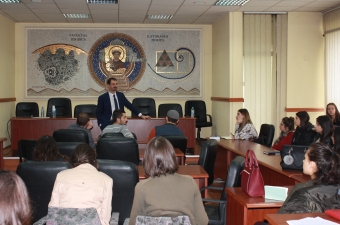As part of the Tribunal’s Youth Outreach Programme, Adrian Plevin, an Associate Legal Officer in the ICTY Office of the President, delivered a lecture to a group of 70 students and staff at the Law Faculty of Saint Cyril and Methods University in Skopje, Former Yugoslav Republic of Macedonia (FYROM) on 20 October 2016. The lecture concerned ICTY practice in adjudicating the core crimes enshrined in the Tribunal’s Statute: genocide, crimes against humanity and war crimes.
The students responded positively to the lecture and were eager to learn more about the Tribunal’s history and work. They engaged in discussions regarding the origins and development of legal concepts underpinning the crimes within the ICTY’s jurisdiction, as well as the ICTY’s role in interpreting and applying this body of international criminal law. The group was also interested in learning about how the Tribunal distinguished between situations in which genocide had occurred and those where it had not, the legal distinction between the different crimes in the Tribunal’s Statute, and the need to recognise distinct crimes which often involved the same underlying acts.
Staff and students expressed their appreciation for the ICTY’s engagement in the region, emphasising the importance of such opportunities for students to understand the application of the rule of law in an international environment and in the context of events that had occurred in the region. They also welcomed the opportunity to receive Outreach documentaries and publications produced by the ICTY.
Assistant Professor Elena Mihajlova remarked that „the lecture was an ideal addition on the lectures of International humanitarian law, International criminal law and International public law that our law students follow. This lecture brought back the attention on the significance of international law in societies like ours, palsied in perpetual transition and unstable legal order“.
The Youth Outreach project is funded by the government of Finland and is part of the Tribunal’s Outreach Programme, which enjoys the generous support of the European Union.


